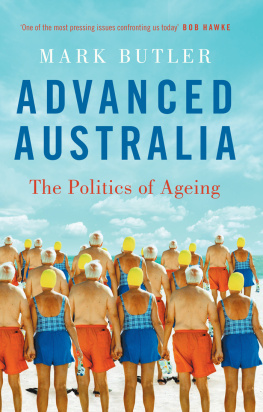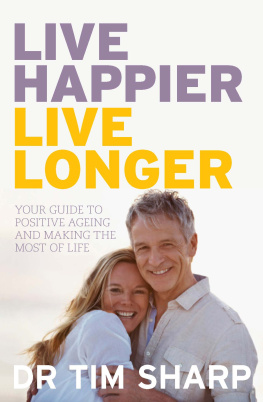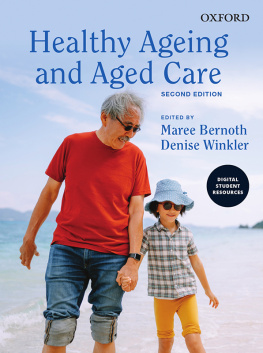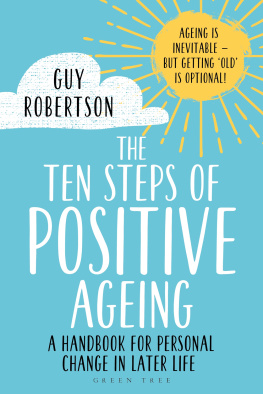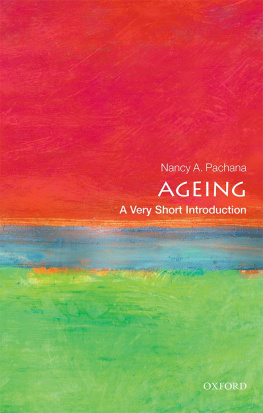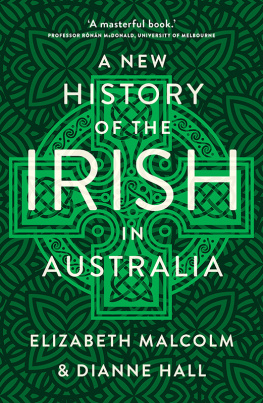Mark Butler has been the Labor Member for Port Adelaide in the federal parliament since 2007 and served as Minister for Ageing in the Gillard government. He has also held the ministries of Mental Health, Housing, Homelessness, Social Inclusion, Climate Change and the Environment. In 2013 Mark was awarded the Alzheimers Disease International Award for Outstanding Global Contribution to the Fight against Dementia. Mark is currently the Labor spokesperson for the Environment, Climate Change and Water and national president of the Australian Labor Party.
ADVANCED AUSTRALIA
The Politics of Ageing
MARK BUTLER

MELBOURNE UNIVERSITY PRESS
An imprint of Melbourne University Publishing Limited
1115 Argyle Place South, Carlton, Victoria 3053, Australia
www.mup.com.au
First published 2015
Text Mark Butler, 2015
Design and typography Melbourne University Publishing Limited, 2015
This book is copyright. Apart from any use permitted under the Copyright Act 1968 and subsequent amendments, no part may be reproduced, stored in a retrieval system or transmitted by any means or process whatsoever without the prior written permission of the publishers.
Every attempt has been made to locate the copyright holders for material quoted in this book. Any person or organisation that may have been overlooked or misattributed may contact the publisher.
Cover design by Design by Committee
Typeset by Megan Ellis
Printed in Australia by McPhersons Printing Group
National Library of Australia Cataloguing-in-Publication entry:
Butler, Mark C. (Mark Christopher), 1970 author.
Advanced Australia/Mark Butler.
9780522868937 (paperback)
9780522868944 (ebook)
Older peopleAustraliaSocial conditions.
Older peopleGovernment policyAustralia.
Population ageingAustralia.
AustraliaSocial policy21st century.
305.260994
CONTENTS
ACKNOWLEDGEMENTS
Thank you to my family, Suzanne, Ellie and Isaac, for tolerating my time on summer holidays and weekends spent reading and writing.
Thank you to the thousands of older Australians who attended my seniors forums during my time as Minister for Mental Health and Ageing, who gave me such detailed insight into their hopes and fears. A particular thank you to the people who were interviewed for this book (whose names have of course been changed to protect their privacy).
I also wish to thank my parliamentary colleagues who took time to provide comment on draft chapters. Thanks too to my staff for all their tolerance and support.
INTRODUCTION
A Bigger, Older Australia
My mother is a very typical Baby Boomer, born in 1951. Mums grandfather was in the first landing party at Gallipoli, and her father served in North Africa and New Guinea in World War II. In stark contrast to the privations and struggles of those earlier Australian decades, Mum and her siblings grew up in the post-war prosperity of Adelaide in the 1950s and 1960s, marvelling at television and the Beatles. Never before had it been so much fun to be young. Like many of her generation, Mum married earlya Vietnam veteran and had her children at the peak of the Echo Boom in 1970 and 1971. Mum and her friends were presented with opportunities at work that very few women had had before, and they enthusiastically took them up. Relative economic independence along with the Whitlam governments family law reforms also meant that they had a freedom to leave unfulfilling relationships, which their mothers and grandmothers had generally lacked.
Mum worked hard from the time she was a teenager, raising childrensometimes by herselfand exploring a number of different careers. She has now settled into what we call her third age: a phase of life in which those twin demands of child-rearing and paid work have dropped away, and more time and energy can be devoted to self-fulfilment. Mum still does some paid work, but also paints, travels and spends time with her grandchildren. She is fit and healthy, and an avid consumer of all manner of things, both cultural and material. Mum came of age in a political sense during the Whitlam era, and her worldview remains deeply shaped by that experience. She is confident and forthright, and places a great deal of stock in the importance of treating others with respect. So it comes as quite a shock to her to be frequently spoken to by younger shop assistants as if she were either a small child or simply incapable of processing serious thoughts. This is a common storyBaby Boomers moving into their third age in good health and with lots of plans are now feeling the rough end of modern societys demeaning attitude towards age.
In 2011, the oldest members of the generation that sang I hope I die before I get old started to turn sixty-five and qualify for the Age Pension. No generation in history has attracted more analysis than the Baby Boomers, and for good reasonthey have profoundly changed society over the course of their lives. Beyond its capacity to drive social change, the Baby Boomer generation is also remarkable for the degree of contrast with the generations that preceded it. The pre-Boomers are now in their seventies and eighties, dominating the aged care and geriatric health systems. To the extent that generations can be stereotyped, theirs is usually described as stoic and unassuming and, in Australia, labelled the frugal and silent generation. They could scarcely be further removed from the outspoken and ambitious Baby Boomer generation.
In Australia, the ageing of the Baby Boomers doesnt represent a statistical hump; instead, it presages a long-term trend for Australia in the age mix of our population. The most striking thing about the Boomers is how much bigger their numbers are than the pre-Boomers who were born during a period of exceptionally low fertility in Australia, caused by the Great Depression. Although their numbers were swelled by the early part of the post-war immigration program, theirs is still a relatively small cohort.
The ageing of the Baby Boomers represents one of Australias most challenging demographic shifts ever. The most obvious challenge lies in the numbers. Once this generation numbering more than 5 million have all celebrated their sixty-fifth birthdays (in 2030), there will be 6 million Australians in that upper age bracket, in contrast to around 3.5 million today. The demand for age-related services will increase dramatically. And there are substantial challenges in supporting that number of people (mostly) in retirement to stay financially secure, active, healthy and connected to their communities. This shift is not a one-off event isolated to the Baby Boomers. Australias strong history of immigration and healthy birth rates mean thatunlike many other nationsthe generations that follow them are even bigger than the Boomers. The present shift is a window into the new normal for Australia: where a much larger share of the population is sixty-five or older.
The Baby Boomers are also the first generation to benefit fully from the longevity revolution of the twentieth century that added the best part of three decades to Australian life expectancy. The opportunity to live a fulfilling third age is one which previous generations could only imagine and which we are only beginning to comprehend. How we manage this shift has profound implications for the generations to come as much as for the Baby Boomers. Happily, theirs is a generation well accustomed to being on the cutting edge of social and economic change. The Boomers re-engineered every phase of their life in a profoundly enduring way: their adolescence (a term they coined), their working lives (especially for women) and their parenting. The generations that have followed have largely lived their lives within those new paradigms, overwhelmingly to their advantage. The Baby Boomers will almost certainly have the same impact on what it means in Australia to be older.
Next page
